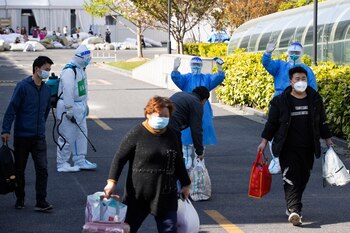
Shanghai, China's financial center, surpassed the daily record for covid-19 infections on Monday for the tenth consecutive day with 26,087 new cases, detected in six rounds of mass testing in the city.
The number of people with symptoms dropped to 914 from more than 1,000 on average over the weekend, and the vast majority of those infected did not show symptoms of illness, according to health authorities.

Therefore, despite the record number of cases, the city began to ease confinement in some areas on Monday, as authorities strive to gradually return the city to normal after more than weeks of strict quarantine. 11 thousand people were discharged on Sunday, authorities reported.
Pressure on authorities in China's most populous city, and one of the richest, has been mounting as residents become increasingly frustrated as restrictions advance, causing some to struggle to find enough food and medicine.
Shanghai is grouping residential units into three risk categories as a step towards allowing “appropriate activity” by those in neighborhoods without positive cases for a period of two weeks, said city official Gu Honghui.
“Each district will announce the specific names of the first batch (of communities) divided into the three types, and the subsequent three lists will be announced in a timely manner,” Gu said at a press conference.

While it was unclear how many of the city's 25 million residents will be relieved of lockdowns immediately, the passage promises some relief for many locked up for more than three weeks in the battle against China's biggest outbreak since the coronavirus was first detected in central Wuhan in late 2019.
A video, widely shared online, showed the occupants of buildings shouting from the windows their despair.
Gu said Shanghai was divided into 7624 areas that are still sealed, with a group of 2460 now subject to “checks” after a week without new infections, and 7565 “prevention areas” opening after two weeks without a positive case.
Those in “prevention areas” moving around their neighborhoods should observe social distancing and could be resealed if there are new infections, Gu added.
One of the first districts to publish its list was the Jinshan Industrial Area in the far southwest of Shanghai, which published the names of residential sites still in the high and medium risk categories.

NO CHOICE
Some social media users criticized the easing measure as a big risk at a time of a new record number of daily cases, but others said Shanghai had no choice.
“I think this is the Shanghai government admitting that it cannot continue to block as long as it ensures that its citizens do not die of hunger,” said one Weibo user, posting under the name of Ruan Yi.
Complaints about the controls continue, and some in the city's Xuhui district told Reuters that neighborhood committees had put locks and bicycle chains on the doors of their homes since Sunday night to confine them to their homes.

China's zero-tolerance approach to COVID-19, which prescribes quarantine for anyone who tests positive even in the absence of symptoms, is increasingly strained by the highly infectious, though less deadly, Omicron variant.
Politics has halted almost all international travel and is taking an increasing economic toll as cities impose restrictions, with southern Guangzhou and eastern Ningbo being the last to do so, even as other countries try to live with the disease.
On Monday, the European Chamber of Commerce in China said it sent a letter to China's Council of State or Cabinet, describing the challenges for businesses due to recent COVID prevention measures and urging the country to review the policy.

The data also showed that car sales in China plummeted in March as the country's restrictions to curb COVID-19 outbreaks took their toll, with Tesla Inc (TSLA.O) among automakers feeling the pain of limits on production. Read more
Still, the policy of “dynamic authorization” remains Shanghai's “best option”, said national official Liang Wannian.
It was misleading to see Omicron as a “big flu,” and letting China's guard down would expose its huge elderly population to risk, especially as the virus mutates, said Liang, who heads a National Health Commission panel on COVID-19.
“If we go to bed, the epidemic would simply be a disaster for these kinds of vulnerable people,” said Liang, quoted by the ruling Communist Party's People's Daily, using a popular term to do the minimum.
Keep reading:
Últimas Noticias
Debanhi Escobar: they secured the motel where she was found lifeless in a cistern
Members of the Specialized Prosecutor's Office in Nuevo León secured the Nueva Castilla Motel as part of the investigations into the case

The oldest person in the world died at the age of 119
Kane Tanaka lived in Japan. She was born six months earlier than George Orwell, the same year that the Wright brothers first flew, and Marie Curie became the first woman to win a Nobel Prize

Macabre find in CDMX: they left a body bagged and tied in a taxi
The body was left in the back seats of the car. It was covered with black bags and tied with industrial tape
The eagles of America will face Manchester City in a duel of legends. Here are the details
The top Mexican football champion will play a match with Pep Guardiola's squad in the Lone Star Cup

Why is it good to bring dogs out to know the world when they are puppies
A so-called protection against the spread of diseases threatens the integral development of dogs




